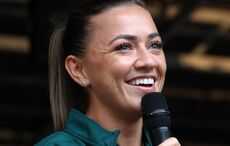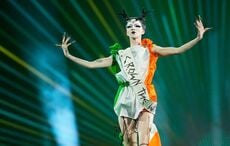Review of "Martin McGuinness, A Life Remembered": Martin McGuinness turned 18 in 1968, as luck would have it, or as fate decreed, he came of age at the first major eruption of the Troubles.
In the north in 1968 the state forces were busy suppressing peaceful civil rights marches, their shocking baton charges making world headlines.
The unionist government found themselves increasingly condemned as various forms of state violence continued, coming to a head in 1972 when the Parachute Regiment killed 13 unarmed civilians on January 30 of that year.
In Derry after the sickening events of Bloody Sunday the IRA could hardly contend with the number of civilians volunteering to join it.
As longtime Ireland correspondent Henry McDonald remarks in his impressive new photographic record Martin McGuinness, A Life Remembered, early photos of McGuinness are astonishing for their open defiance.
But perhaps his defiance wasn't all that surprising. In 1972 McGuinness was pictured brandishing an old German Luger pistol, then a month later he was pictured at a press conference with the founding fathers of the Provisionals. Many observers felt that after Bloody Sunday his growing militantism, and that of the community he sprang from, was directly proportional to the anger and heartbreak of the city that had raised him.
But it was also McGuinness's endorsement of the IRA campaign and his unapologetic membership in it that would make him such a divisive figure to many.
In Dublin he was prosecuted for IRA membership in 1973, and later in the north he was unsuccessfully prosecuted on the same charge in 1976. As time went on however he became more and more involved with the political rise of Sinn Fein whilst his perspective on the effectiveness of the 'armed struggle' began to alter.
In McDonald's evocative photo record you can see McGuinness's progress from volunteer to paramilitary leader to politician. His lifelong friendship with Gerry Adams, a strikingly different kind of personality, is also charted in the book; it was a friendship that endured from the early days of Sinn Fein's emergence as a serious political party in the early 1980's right through to his death in 2017.
McDonald lays it all out in his book, giving us a portrait of McGuinness in full, hearing from those who admired him and those who loathed him.
One of the most striking developments of all was the genuine friendship McGuinness struck up with his former most implacable foe, Ian Paisley.
Dubbed “the chuckle brothers” by the bemused press, the former IRA commander and the former firebrand preacher had been mellowed by experience by the time they finally encountered and both had determined that violence could not and would not achieve their political ends.
What brought them together was their shared belief that the people of the north were better able to govern themselves than any UK government.
At his funeral former president Bill Clinton offered a stark challenge to the mourners, “If you want to finish his legacy, go and finish the work he started.” That challenge still stands.
McDonald's book is a sobering reminder of how far Guinness came in his personal and political life and how far we have all yet to travel.
Blackstaff Books $26.38.




Comments